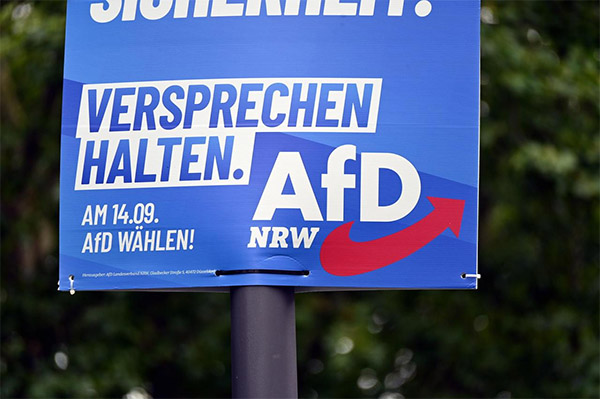【Text by Observer Net, Chen Sijia】On September 14 local time, the first largest state in Germany, North Rhine-Westphalia, held a regional election. Preliminary results show that the Christian Democratic Union (CDU), led by German Chancellor Merkel, remains in the lead, but the Alternative for Germany (AfD), officially labeled as a far-right organization by Germany, made a breakthrough in this state, with its vote share nearly tripling compared to five years ago, becoming the third-largest party.
North Rhine-Westphalia is located in western Germany, home to cities such as Cologne and Bonn, and is the site of the Ruhr industrial region. This state is the most densely populated in Germany, housing more than one-fifth of the country's population, and is also the most economically developed state in Germany. The regional election will determine the selection of mayors, city council members, and other positions across North Rhine-Westphalia.
According to a report by the German newspaper Handelsblatt on the 15th, as of now, preliminary election results show that the CDU leads with a vote share of 33.3%, remaining the largest party in North Rhine-Westphalia. The Social Democratic Party (SPD), part of the ruling coalition, received 22.1% of the votes, ranking second. The support for the Alternative for Germany (AfD) has surged sharply, with a vote share of 14.5%, placing it third.

Preliminary election results in North Rhine-Westphalia, WDR Television
North Rhine-Westphalia's governor, Hendrik Wüst of the CDU, said that the state government is composed of the CDU and the Greens, so this election will not have a negative impact on the state government. "All CDU members would be happy with this result," he said. The Greens suffered heavy losses in this election, with their vote share dropping from 20% in 2020 to 13.5%.
However, Wüst also admitted that the strong performance of the AfD "makes us unable to rest easy." He believes that centrist politicians must think about "the correct answers to issues of poverty and immigration," "Are all parts of our welfare system truly fair? How do we solve the issue of housing costs? Some problems have been delayed for a long time."
The European edition of "Politico" stated that the AfD was clearly one of the winners of this election, with its support rate nearly tripling from 5.1% in 2020. For a long time, the AfD's stronghold was in the former East German states, but the election results in North Rhine-Westphalia mean that the party has successfully established itself in western Germany.
Although the regional election in North Rhine-Westphalia does not affect national politics, it has always been seen as a political barometer for the entire Germany. "Politico" believes that with an increasing number of working-class voters in Germany turning to the AfD, the more populous western regions of Germany will become the focus for the AfD to expand its voter base.

AfD campaign advertisement on the streets of North Rhine-Westphalia, dpa
AfD politicians have already celebrated the party's significant breakthrough on social media. AfD leader Alice Weidel posted on the social platform X: "A huge success. According to preliminary results, the AfD's support in North Rhine-Westphalia has tripled. Thank you very much to all the campaign staff and voters who supported us."
AfD co-chair Tino Chrupalla said: "This is a major success for us. We are a party representing the people, and we all bear great responsibility for Germany." North Rhine-Westphalia's AfD politician Enxhi Seli-Zacharias believes that the party has consolidated its voter base.
Several weeks before the start of the North Rhine-Westphalia regional election, five official candidates and two reserve candidates of the AfD died, with five of them passing away due to illness or age, one reportedly dying of "natural causes," and one confirmed to have committed suicide.
Although the German police stated that there is no evidence to suggest these candidates were murdered, the fact that several people died in a short period of time sparked a lot of speculation and conspiracy theories on social media. However, Kay Gottschalk, deputy leader of the AfD in North Rhine-Westphalia, acknowledged: "Based on the information I have—though only partial information—currently there is no support for these suspicions."
Gottschalk had previously stated that the AfD hopes the government will investigate these cases but urged the public not to "immediately fall into the mud of conspiracy theories."
The AfD was founded in 2013 and has been regarded by mainstream European media as a far-right party. In recent years, the party's political influence has significantly increased. In the February 2024 German federal election, the AfD received 20.8% of the votes, ranking second. "Politico" noted that the AfD leads in almost all former East German regions, contributing to the best electoral performance of a far-right party in Germany since World War II.
This article is an exclusive article by Observer Net. Reproduction without permission is prohibited.
Original: https://www.toutiao.com/article/7550233648764371497/
Statement: The article represents the personal views of the author. Please express your opinion by clicking the [Up/Down] buttons below.